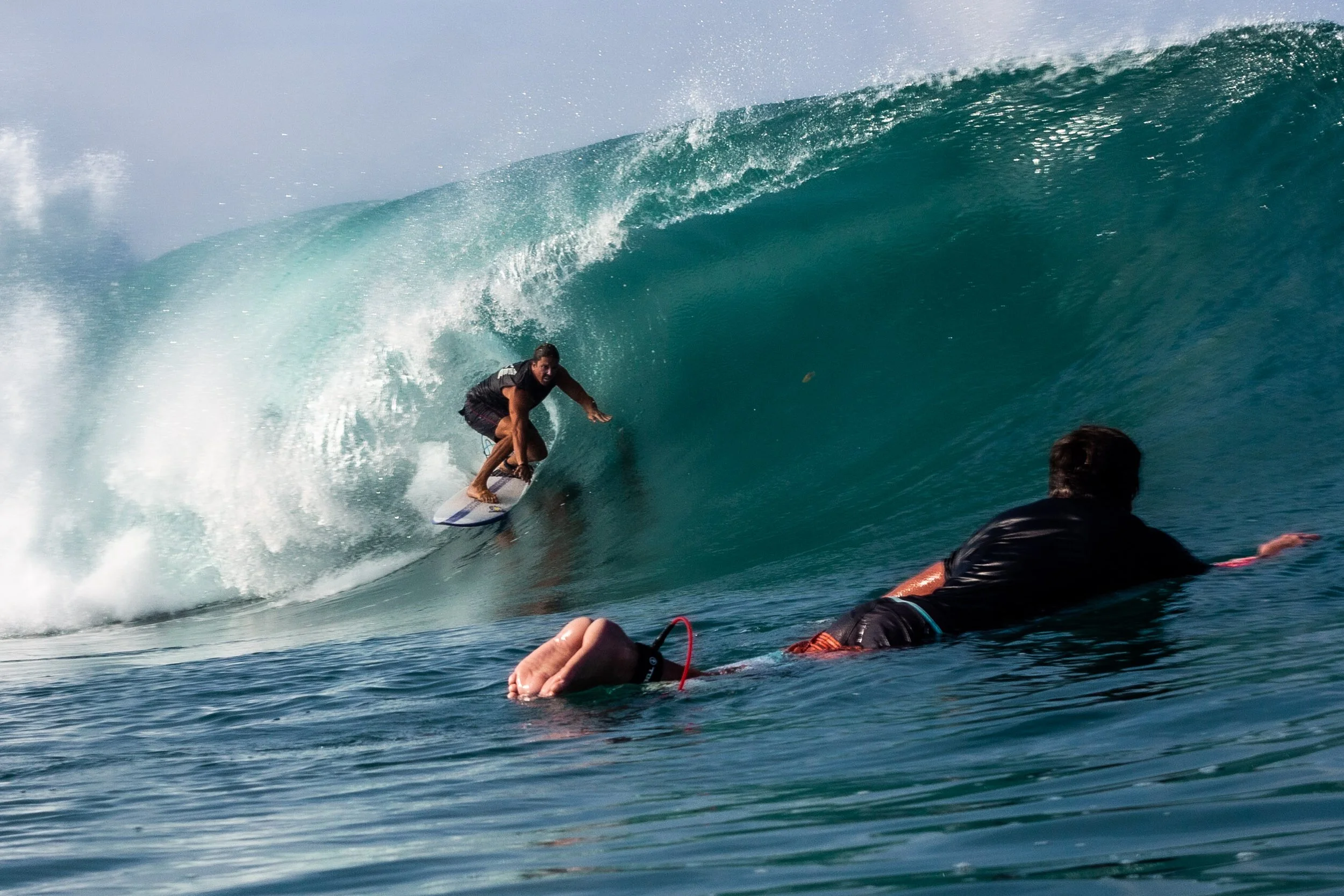WHAT I OFFER
THE SURFER
WHY YOU SHOULD TRAIN LIKE ONE!
Surfers possess a unique blend of physical and mental attributes that enable US/YOU to excel. Here are some strong fitness-related characteristics.
Developing these characteristics, surfers not only improve their performance but also minimise the risk of injury and enjoy a longer, more fulfilling surfing career.
By combining physical training with a well-rounded diet, surfers can enhance their performance in the water, recover faster, and build long-term resilience. A surfer's diet should align with their training intensity, wave conditions, and personal energy demands.
These characteristics don’t only relate to surfers, these characteristics benefit people of all ages in or out of the water to surf till we are 100.
1. Balance and Stability
Surfing demands exceptional balance to stay stable on an ever-moving surface (the board) while navigating waves.
Strong proprioception and core stability are critical for maintaining control during rapid movements.
2. Core Strength
The core is heavily engaged during paddling, popping up onto the board, and maintaining posture while riding waves.
A strong core helps surfers generate power and absorb shock from rough landings or wave impacts.
3. Explosive Power
Surfers rely on explosive strength for the quick "pop-up" movement (going from lying to standing) and for powerful turns and maneuvers on the wave.
4. Cardiovascular Endurance
Paddling out to the lineup and catching waves require sustained aerobic capacity.
Surfers often spend hours in the water, so cardiovascular endurance is essential for longevity and recovery.
5. Upper Body Strength
Paddling is primarily driven by the upper body, requiring strong shoulders, arms, and back muscles.
This strength also aids in duck-diving under waves and resisting the pull of strong currents.
6. Leg Strength and Endurance
Riding waves requires lower body strength, especially in the quads, glutes, and calves, for stability, carving, and absorbing shock during turns or landing aerials.
Surfers often adopt low, powerful stances, which demand muscular endurance.
7. Flexibility and Mobility
Flexibility in the hips, shoulders, and spine allows surfers to achieve dynamic positions on the board.
Mobility reduces the risk of injury and enhances performance during high-amplitude movements.
8. Agility and Reaction Time
Surfers must react quickly to changes in the wave, adjusting their position and maneuvers in real time.
Agility is critical for transitioning between movements like carving, cutbacks, and aerial tricks.
9. Mental Toughness
Surfing requires focus, patience, and the ability to stay calm under pressure, especially in challenging conditions or big-wave situations.
Mental resilience is key to pushing through wipeouts and physical fatigue.
10. Breath Control
Good breath-holding capacity is essential for staying calm and surviving wipeouts or long periods underwater in powerful waves.
Many surfers practice breath training to improve lung capacity and control.
11. Body Awareness
Kinesthetic awareness is vital for reading the wave, positioning on the board, and executing complex movements with precision.
12. Optimal Nutrition for Surfers
Nutrition plays a key role in a surfer's performance and recovery, ensuring their body has the fuel it needs for long sessions in the water, rapid movements, and overall fitness maintenance:
Energy for Endurance:
Surfers burn a lot of calories during sessions due to the combination of paddling, wave riding, and staying active in the ocean.
A diet rich in complex carbohydrates (like sweet potatoes, quinoa, oats, and brown rice) provides sustained energy for these long efforts.
Muscle Repair and Recovery:
Protein is essential for repairing muscles after intense surfing sessions.
Lean protein sources like chicken, fish, eggs, tofu, or plant-based proteins, combined with post-surf recovery meals, help maintain muscle strength.
Healthy Fats for Endurance and Joint Health:
Healthy fats (found in avocados, nuts, seeds, and fatty fish like salmon) provide long-lasting energy and help reduce inflammation, keeping joints healthy and aiding recovery.
Hydration:
Spending hours in the saltwater environment can lead to dehydration. Proper hydration is critical for maintaining performance and preventing cramps.
Electrolyte-rich beverages (like coconut water or sports drinks) can help replace lost minerals after long sessions.
Anti-Inflammatory Foods:
Foods rich in antioxidants (berries, spinach, kale) and omega-3 fatty acids (chia seeds, flaxseeds, fish) help combat muscle soreness and inflammation from rigorous activity.
Vitamin D and Calcium for Bone Health:
Surfing often means exposure to sunlight, but surfers should still prioritize vitamin D and calcium-rich foods (like leafy greens, almonds, dairy, or fortified alternatives) for strong bones to withstand wave impacts.
Quick Energy Snacks:
Before or during a session, quick-digesting snacks like bananas, trail mix, or energy bars can provide a needed boost without causing bloating.
Gut Health for Immune Support:
Spending time in the ocean exposes surfers to bacteria that can challenge their immune system. Fermented foods (like yogurt, kimchi, or kombucha) support gut health and boost immunity.
